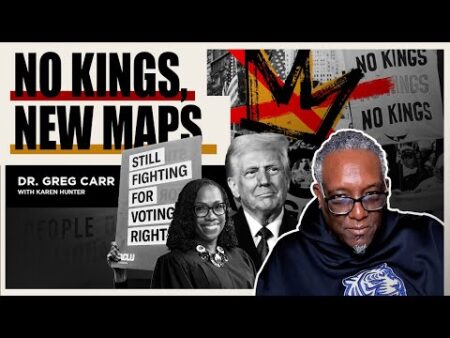President and Director-Counsel of the NAACP Legal Defense Fund Janai Nelson recently argued before the Supreme Court in defense of Louisiana’s redrawing of the congressional map to include a second-majority Black district.
Last Wednesday, Nelson took to the court to argue in defense of a group of Black voters who appealed a lower court’s decision to challenge the voting map on the basis that it violated equal protection under the law.
In 2024, the map was redrawn to include a second-majority Black district after an initial map drawn by the legislature attempted to dilute Black voting power to strengthen the control of white representatives.
The newly redrawn map prompted a lawsuit by 12 “non-African American” Louisiana voters who claimed that a second-majority Black district took away voting rights from non-Black voters. The lower court case ruled in their favor, bringing the case to the Supreme Court.
Per Nelson, the case is an example of racially polarized voting and that the subsequent redawing of the map to include representation for Black voters- a demographic that makes up approximately 31% of the state- does not violate the constitution. Instead, using race to gain an advantage for a specific party is unconstitutional.
Nelson also argued that the non-discrimination part of the Fifteenth Amendment has no time-limit in response to Justice Brett Kavanaugh’s claim that “race-based remedies” should not be “indefinite.”
“The extremely racially polarized voting that we have in Louisiana cannot be explained away by party,” said Nelson at the court per NPR. “We’re talking about racially polarized voting that is above 84%.”
With the case, however, Supreme Court conservative justices are attempting to reframe the issue into a way to weaken Section 2 of the Voting Rights Act. This specific part of the law prohibits voting discrimination on account of race and provides the basis for judicial relief if decisions are made in violation.
If the Supreme Court is successful in “gutting” Section 2, states would be given the opportunity to dilute the voting power of BIPOC communities without facing repercussions. Although it is not clear just how the law would be affected, it is believed that conservative justices, who currently have 6-3 majority, would advocate for making it harder to prove that a case violates Section 2.
With the changes to Section 2, the GOP would be allowed to redraw 19 districts across the nation to bolster their representation in the 435-seat House.
“Section 2 of the Voting Rights Act is a core living legacy of that struggle. Without it, states could carve up Black and brown communities like puzzle pieces until our votes no longer matter,” said the Executive Director of the Louisiana branch of the ACLU, Alanah Odoms. “Weakening Section 2 would open the door to rampant racial gerrymandering and take us back to a pre-1965 America, where discrimination was the rule, not the exception.”
A decision on the court case is expected by the end of June 2026.







